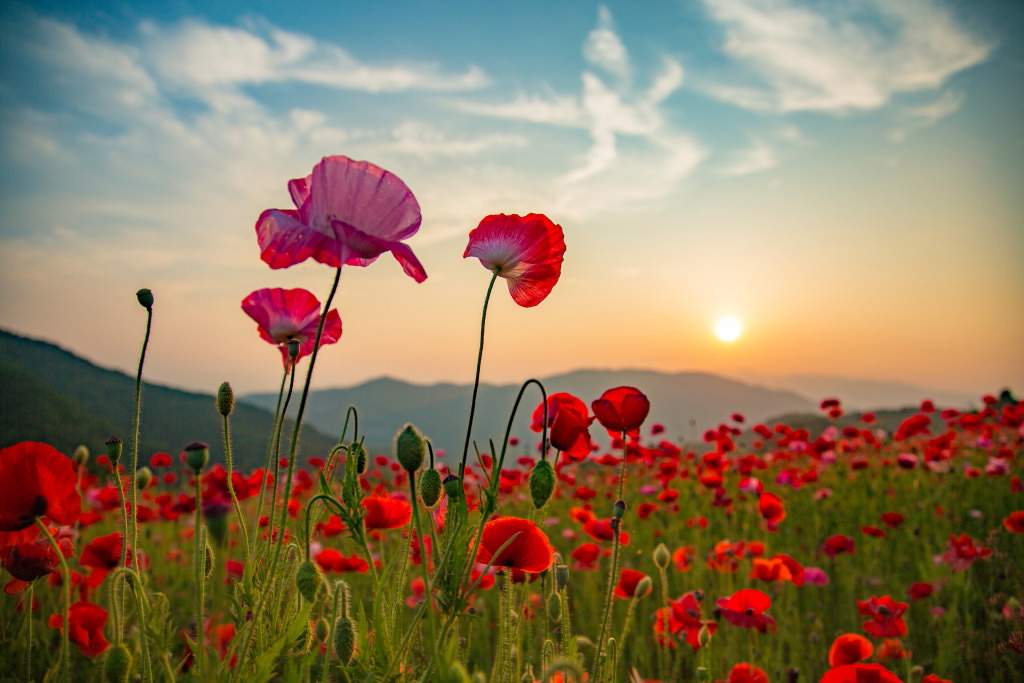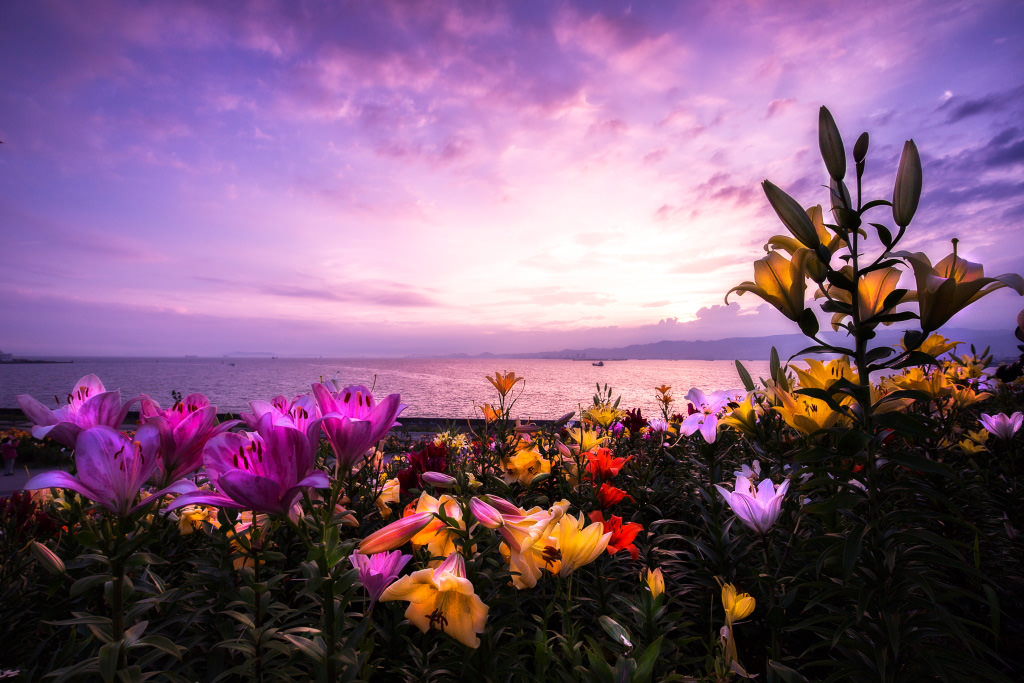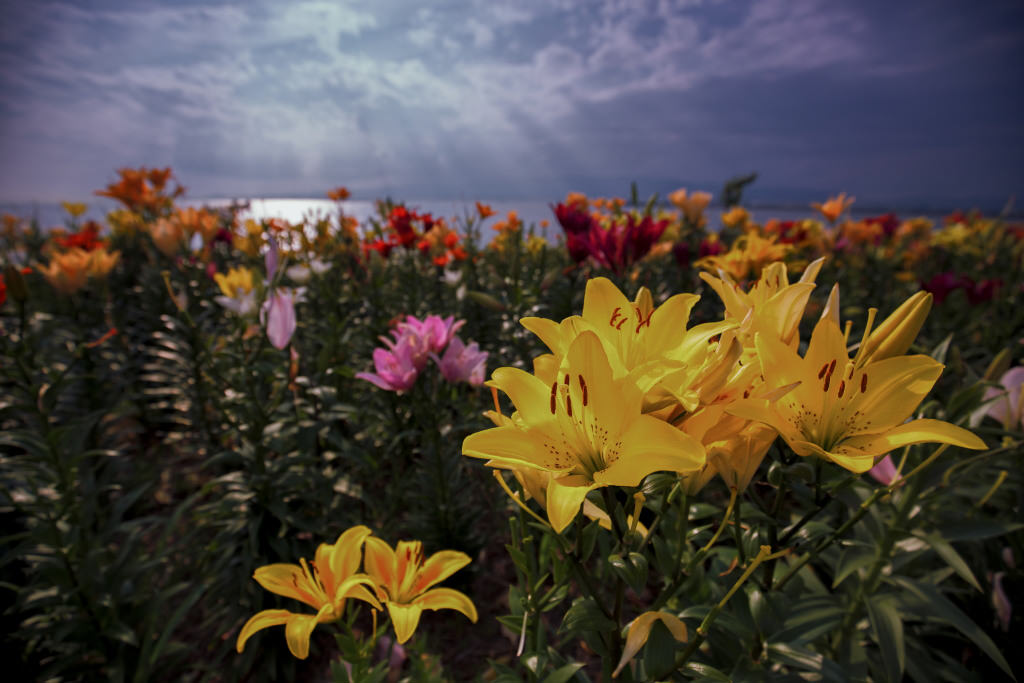The rich colours of the evening sky can add a dramatic element to your landscape photography, especially if it involves flowers shot in backlight. Here, we share two such photos and some tips from the photographers about how they achieved the shot. (Reported by: Rika Takemoto, Yoshiki Fujiwara)

Photo 1: A vast poppy field against the evening sun

EOS 5D Mark III/ EF24-105mm f/4L IS USM/ FL: 47mm/ Aperture-priority AE (f/16, 1/25 sec, EV+1.3)/ ISO 200/ WB: White fluorescent light
Date of shoot: Late May
Photo by Rika Takemoto
Step 1: Shoot downward from a high position
I aimed to create a dramatic image by framing the field of poppies together with the evening sun. The field extended all the way into the background, and in order to bring out that sense of scale, I initially shot at eye level, using a tripod. However, that made the elements in the frame look very scattered. I realized that I needed to create a point of interest in the frame by framing the image so that the poppies in front of me appeared larger and closer. Therefore, I found a location where there were some tall poppies directly in front of me, and also adjusted my tripod so that it was at waist level.
I had a few different shooting positions in mind, but I eventually chose this one because it provided a good compositional balance between the height of the sun, the silhouettes of the mountains and the poppies in the foreground.
Step 2: Use exposure compensation so that the entire shot appears vividly coloured
I went to the location at around 6pm, and even then, the surroundings were already rather dark. If I were to shoot without any adjustment in settings, the image would end up with the poppy fields depicted too dark. I therefore used exposure compensation to make the overall image appear brighter. As I also wanted to preserve the tonal gradations in the sun and the sky, I used trial-and-error to determine the exposure-compensation value, increasing it gradually until I found the optimum setting at EV+1.3.
My aperture setting was a narrow f/16 as I wanted to use deep focusing to depict the vast expanse of the poppy field, and also create a slight starburst effect to make the rays of the sun obvious. To intensify the red of the poppies and the blue of the sky, I made use of a polarizing filter (PL filter).
Failed shot: Shooting the poppies from a low angle didn’t achieve my intent

EOS 5D Mark III/ EF24-105mm f/4L IS USM/ FL: 24mm/ Aperture-priority AE (f/4, 1/500 sec, EV+1.0)/ ISO 200/ WB: Auto
Photo by Rika Takemoto
For this shot, I aimed at the poppies from below, making sure to include the setting sun. The backlighting on the poppies right in front makes the petals and fine hairs on the stems appear a bit translucent, which creates a lovely, ethereal image. However, this is not the effect I wanted, which was to bring out the vast scale of the poppy field.
Photo 2: Lilies illuminated by the glow of the evening sun

EOS 6D/ EF16-35mm f/4L IS USM/ FL: 16mm/ Manual exposure (f/9, 1/200 sec, EV-1.0)/ ISO 100/ WB: Auto
Date of shoot: mid-Jun
Photo by Yoshiki Fujiwara
Observe and wait until the sun is horizontally above the flowers
In this shot, the sunlight shines through the lilies in a way that makes them glow gently as though illuminated with a lamp.
When sunlight illuminates plants and flowers by passing through them, it makes their colours appear more vivid. Have you ever looked up at the sky through the tops of trees with fresh leaves? If you do, you will see that the sun above your head seems to make the green of the leaves brighter and more luxuriant than usual. That is the effect that I wanted to recreate with the lilies in this image.
The lilies here were growing from a rather low position on the ground, so the only way to include more than one of them was to shoot using a horizontal orientation. Because of that, I waited until the sun was horizontally above the lilies before I shot (time of shoot: 7.45pm).
Failed shot: The colours of the flowers don’t look as vivid when shot in the early evening

EOS 6D/ EF16-35mm f/4L IS USM/ FL: 16mm/ Aperture-priority AE (f/4, 1/800sec, EV+0.3)/ ISO 100/ WB: Auto
Photo by Yoshiki Fujiwara
This shot was taken at 4.45pm. The sun’s position high in the sky made it hard to get an angle where the sun shines right through the flowers, and I could not capture the flowers with the same translucency and vivid colour.
Here are more ideas for photographing flowers:
How Do I Photograph Flowers More Dramatically?
Composition Techniques for Wide-Angle Lenses
Photographing Flowers: How to Create Brilliant Bokeh Circle Spotlights with a Macro Lens
You may also be interested in:
4 Steps to Capture a Soft, Dreamy-looking Backlit Portrait
Receive the latest update on photography news, tips and tricks.
Be part of the SNAPSHOT Community.
Sign Up Now!
About the Author
A monthly magazine that believes that enjoyment of photography will increase the more one learns about camera functions. It delivers news on the latest cameras and features and regularly introduces various photography techniques.
Published by Impress Corporation
Formerly a professional snowboarder, Fujiwara took the opportunity to embark on a second career as a photographer after retiring due to an injury. He has since won a number of international photography awards for his nature photography and cultural portraits. In 2019, he became the first Japanese person to win an award in the 'People' category of the 2019 National Geographic Travel Photo Contest. Besides providing photos for National Geographic, Fujiawa also contributes to camera magazines in Japan and abroad, and engages in a wide range of activities including books, talk shows, and company calendars.
http://www.yoshiki-fujiwara.com/
Instagram: @yoshiki_fujiwara
A landscape photographer, Takemoto started photography as a hobby since 2004. In 2007, she became involved with managing a photo-sharing website. She studied under the natural landscape photographer Yoshiteru Takahashi, and later became a freelance photographer. Since then, she has been shooting landscapes all over Japan (occasionally overseas), covering a wide range of themes.



































